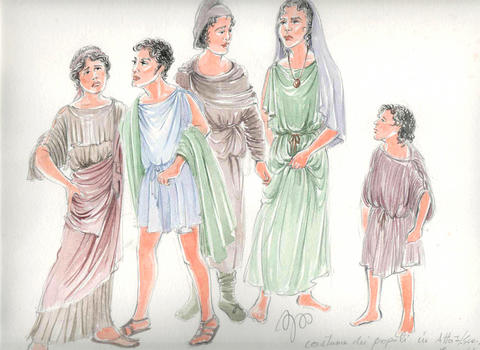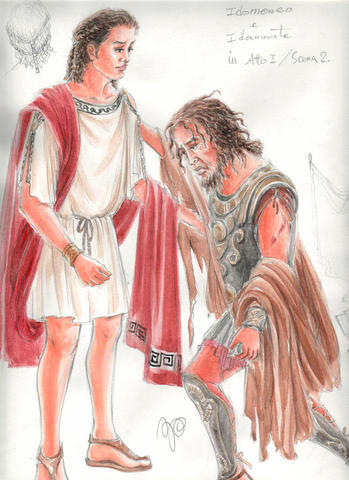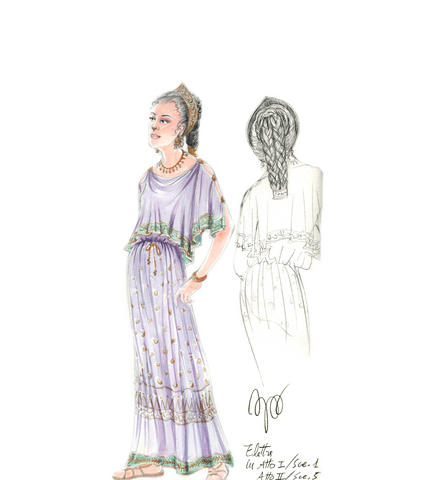"Idomeneo is a treasure in operatic history." So says Tseng Dau-hsiong (曾道雄), who will both direct and conduct Mozart's opera at Taipei's National Theater for three performances next week.
"I guarantee our audiences will not be bored," he continued. "This great opera is very, very attractive."
The question that immediately springs to mind is why there's any need for this justification. No one feels it necessary to say that Mozart's Nozze di Figaro or Don Giovanni won't bore audiences - they've been entertaining them all over the world for more than 200 years. So what's the problem?

PHOTO: COURTESY OF NTCH
The problem is that Idomeneo has been perceived as a colossal bore almost since the day of its premier in Munich in 1781. Despite performances of Mozart's five most popular operas at New York's Metropolitan Opera stretching back to the beginning of the 20th century, the first ever staging there of Idomeneo didn't happen, incredibly, until 1983.
The long-standing tradition is that Mozart, a musical genius in every genre he touched, was essentially a master of operatic comedy. There are wistful passages in Figaro and Giovanni, and solemn ones in The Magic Flute. But Idomeneo is unrelievedly solemn from beginning to end. It belongs to an 18th-century genre known as opera seria (serious opera) as opposed to opera buffa (comic opera), and this, with its empty gesturing of ancient Greek heroes, has long been considered a dead letter.
But with the over-exposure of Mozart's mature comic masterpieces, some people have resolved to discover what lay elsewhere. Maybe opera seria had something to be said for it after all. Handel's operas, written earlier in the 18th century and invariably with classical subjects, had been successfully staged after two centuries of neglect. What about Mozart's ventures in the same genre?

PHOTO: COURTESY OF NTCH
"Mozart showed his wise judgment in the quarrel that was raging at the time about what constituted opera seria," Tsang said. "The details are technical today, but both sides in the argument had their points, and Mozart simply combined the best of each. Idomeneo possesses many beautiful arias and ensembles, together with powerful choruses.
"Taiwanese audiences have seen many Mozart operas, but no opera seria ones. As a musician and educator, I feel it my duty to widen people's experience, and open their eyes to some of his lesser-known masterpieces. For this task I consider Idomeneo an appropriate choice."
The gist of the opera's plot is that Idomeneo, King of Crete, is saved from a shipwreck and vows to sacrifice the first person he sees on shore in gratitude to the god Neptune. Who he meets is his only son Idamante. After attempts to avoid the sacrifice, the princess Ilia, who loves Idamante, offers to be sacrificed instead. But the voice of Neptune decrees he'll be satisfied if Idomeneo hands over power to a new king, Idamante, and his Queen Ilia.

PHOTO: COURTESY OF NTCH
The opera hit the headlines in 2006 when Deutsche Oper in Berlin staged a production where, in an unhistorical departure from the original, Idomeneo was presented with the severed heads of Jesus, Buddha, the Greek god Poseidon and Mohammed. After the protests against the Danish cartoons of Mohammed, the performances were cancelled. Extended discussions followed, but then the show went ahead, without interruption or significant protest.
Nothing comparable can be expected in Taipei - Tseng isn't known for innovative productions. His 2006 Don Giovanni with the Taipei Symphony Orchestra, staged at Taipei's Metropolitan Hall on Bade Road, was traditional but effective. Some of the scenic tricks were run-of-the-mill, but the general effect was lively and colorful.
"I don't believe in distracting audiences from the music with eccentric interpretations," Tseng said in an interview with the Taipei Times last week. Mozart deserved better than that, he said. And the costume designs for Idomeneo show that this will be a production set in the ancient Greek time of the original story.
The orchestra for the Taipei performances, Tseng said, will be essentially a pick-up one, that is an orchestra composed of individuals from different backgrounds and with varying professional commitments. "I am calling it the Orchestra of Taipei Opera Theater. I will serve as both stage director and conductor. I wish to make music and drama together," he concluded.
The move from the Metropolitan Hall to the much larger National Theater represents a daring commercial venture. Even the very popular Don Giovanni didn't quite manage to fill the smaller venue, though attendance was generally good. How a largely unknown work like Idomeneo will fare in the 2,000-seat National Theater is anybody's guess.
Ticket prices range from NT$400 to a hefty NT$10,000. It seems unlikely that many seats will be sold in the upper price bracket. But Taiwan audiences are unpredictable, and the slightest novelty can trigger a big response. But you can never be sure. The performances by the Polish National Opera in the same theater in 2002, staging three operas, were only some 10 percent full.
Arguments about the relative merits and demerits of 18th-century opera seria will be irrelevant to connoisseurs, however, who will quickly snap up this opportunity to see the great composer's rarely-produced work staged for the first time ever here.
"I don't think it's a first for Asia - I think some Japanese opera companies have taken it on before," Tseng said. "But it will certainly be a first for Taiwan."
Idomeneo plays at Taipei's National Theater on Thursday and Jan. 18, beginning at 7pm, and on Jan. 19, beginning at 2pm. For information on ticket availability, call (02) 3393-9888, or visit www.artsticket.com.tw.

In the next few months tough decisions will need to be made by the Taiwan People’s Party (TPP) and their pan-blue allies in the Chinese Nationalist Party (KMT). It will reveal just how real their alliance is with actual power at stake. Party founder Ko Wen-je (柯文哲) faced these tough questions, which we explored in part one of this series, “Ko Wen-je, the KMT’s prickly ally,” (Aug. 16, page 12). Ko was open to cooperation, but on his terms. He openly fretted about being “swallowed up” by the KMT, and was keenly aware of the experience of the People’s First Party

Aug. 25 to Aug. 31 Although Mr. Lin (林) had been married to his Japanese wife for a decade, their union was never legally recognized — and even their daughter was officially deemed illegitimate. During the first half of Japanese rule in Taiwan, only marriages between Japanese men and Taiwanese women were valid, unless the Taiwanese husband formally joined a Japanese household. In 1920, Lin took his frustrations directly to the Ministry of Home Affairs: “Since Japan took possession of Taiwan, we have obeyed the government’s directives and committed ourselves to breaking old Qing-era customs. Yet ... our marriages remain unrecognized,

Not long into Mistress Dispeller, a quietly jaw-dropping new documentary from director Elizabeth Lo, the film’s eponymous character lays out her thesis for ridding marriages of troublesome extra lovers. “When someone becomes a mistress,” she says, “it’s because they feel they don’t deserve complete love. She’s the one who needs our help the most.” Wang Zhenxi, a mistress dispeller based in north-central China’s Henan province, is one of a growing number of self-styled professionals who earn a living by intervening in people’s marriages — to “dispel” them of intruders. “I was looking for a love story set in China,” says Lo,

During the Metal Ages, prior to the arrival of the Dutch and Chinese, a great shift took place in indigenous material culture. Glass and agate beads, introduced after 400BC, completely replaced Taiwanese nephrite (jade) as the ornamental materials of choice, anthropologist Liu Jiun-Yu (劉俊昱) of the University of Washington wrote in a 2023 article. He added of the island’s modern indigenous peoples: “They are the descendants of prehistoric Formosans but have no nephrite-using cultures.” Moderns squint at that dynamic era of trade and cultural change through the mutually supporting lenses of later settler-colonialism and imperial power, which treated the indigenous as